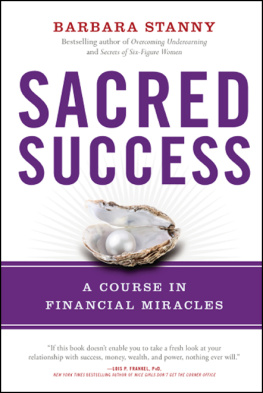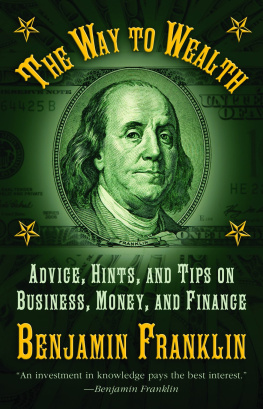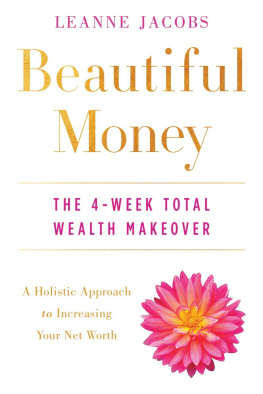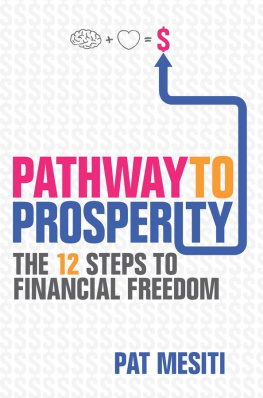The Psychology of Wealth
The Psychology of Wealth
Understand Your Relationship with Money and Achieve Prosperity
Charles Richards, Ph.D.


Copyright 2012 by A Story That Must Be Told, Inc. All rights reserved. Except as permitted under the United States Copyright Act of 1976, no part of this publication may be reproduced or distributed in any form or by any means, or stored in a database or retrieval system, without the prior written permission of the publisher.
ISBN: 978-0-07-178930-1
MHID: 0-07-178930-8
The material in this eBook also appears in the print version of this title: ISBN: 978-0-07-178929-5, MHID: 0-07-178929-4.
All trademarks are trademarks of their respective owners. Rather than put a trademark symbol after every occurrence of a trademarked name, we use names in an editorial fashion only, and to the benefit of the trademark owner, with no intention of infringement of the trademark. Where such designations appear in this book, they have been printed with initial caps.
McGraw-Hill eBooks are available at special quantity discounts to use as premiums and sales promotions, or for use in corporate training programs. To contact a representative please e-mail us at bulksales@mcgraw-hill.com.
TERMS OF USE
This is a copyrighted work and The McGraw-Hill Companies, Inc. (McGraw-Hill) and its licensors reserve all rights in and to the work. Use of this work is subject to these terms. Except as permitted under the Copyright Act of 1976 and the right to store and retrieve one copy of the work, you may not decompile, disassemble, reverse engineer, reproduce, modify, create derivative works based upon, transmit, distribute, disseminate, sell, publish or sublicense the work or any part of it without McGraw-Hills prior consent. You may use the work for your own noncommercial and personal use; any other use of the work is strictly prohibited. Your right to use the work may be terminated if you fail to comply with these terms.
THE WORK IS PROVIDED AS IS. McGRAW-HILL AND ITS LICENSORS MAKE NO GUARANTEES OR WARRANTIES AS TO THE ACCURACY, ADEQUACY OR COMPLETENESS OF OR RESULTS TO BE OBTAINED FROM USING THE WORK, INCLUDING ANY INFORMATION THAT CAN BE ACCESSED THROUGH THE WORK VIA HYPERLINK OR OTHERWISE, AND EXPRESSLY DISCLAIM ANY WARRANTY, EXPRESS OR IMPLIED, INCLUDING BUT NOT LIMITED TO IMPLIED WARRANTIES OF MERCHANTABILITY OR FITNESS FOR A PARTICULAR PURPOSE. McGraw-Hill and its licensors do not warrant or guarantee that the functions contained in the work will meet your requirements or that its operation will be uninterrupted or error free. Neither McGraw-Hill nor its licensors shall be liable to you or anyone else for any inaccuracy, error or omission, regardless of cause, in the work or for any damages resulting therefrom. McGraw-Hill has no responsibility for the content of any information accessed through the work. Under no circumstances shall McGraw-Hill and/or its licensors be liable for any indirect, incidental, special, punitive, consequential or similar damages that result from the use of or inability to use the work, even if any of them has been advised of the possibility of such damages. This limitation of liability shall apply to any claim or cause whatsoever whether such claim or cause arises in contract, tort or otherwise.
To my parents, Lewis Richards and Lydia H. Lockman, and my grandparents, Guy and Rheba Hoffman, who provided the foundation on which I have been blessed to rely and build
Acknowledgments
When I set out to write this book, my intention was to help people develop a new way of thinking about prosperity and thereby improve their lives, even in the midst of an uncertain economy. In the process, I learned more than I could ever have anticipated. As I met and talked with dozens of people to uncover just what a psychology of wealth is, the richness of this topic unfolded. The knowledge, understanding, and inspiration that I gained through listening to their stories and gathering their insights are incalculable, and my gratitude is immense.
My most heartfelt gratitude goes to Katherine Hall, my senior editor, who led the editing and research team. She gave so much of herself and remained in love with the concept despite the long hours. Thanks also for the outstanding work of Sarah Martini, who shepherded the project with dedication and cheerful care. I owe much appreciation to Chris McKinley for his consultation and perspective on the history of finance. Christine Robinson and Teresa Rousch assisted skillfully with research and organization. Thank you to Rob Hall for his contribution to the cover design and to Aimee Hall for her organizational skill. John Scevola and his team provided essential marketing support. To all these gifted individuals, I am grateful.
Working with the McGraw-Hill Professional team has been a great experience. Special thanks to Senior Editor Donya Dickerson. My gratitude also goes to Gary Krebs, vice president and publisher; Mary Glenn, associate publisher; Ann Pryor, publicist; Zach Gajewski, development editor; Ruth W. Mannino, EDP manager; Sara Hendricksen, marketing manager; and Tom Lau, cover designer.
Many thanks to the folks at Planned Television Arts (PTA) for their savvy wisdom. David Hahn, PTA managing director, was a pivotal player in shaping the spirit of this book. Thank you, David, for helping to move this project in the right direction. Id also like to offer special thanks to Jared Sharpe, director, PTA Finance and PTA Sports, and to Alexandra Kirsch, director, PTA Interactive.
Sarah Archer, who obtained many of the interviews recounted here, did a spectacular job of drawing out substantive details. Joseph Bruno Pelle was a quiet inspiration through the initial phases of our research efforts. My thanks to Sarah and Bruno, and to Dan Nyberg and Scott Olson for their artistry.
I was privileged to have private interviews with two of the most brilliant finance minds in America: Dr. Harold Black and Dr. Frederick Miller. My gratitude goes to them and to Marcia Miller, Jeff Burch, Erin Wagner, and Lori Mabry.
Some of the most moving stories I have recounted in these pages are those of Senator Leticia Van de Putte, Representative Johnny Shaw, Dennis Gardin, Joey Wincek, Dr. Rickie Keys, and Tony and Mike Cupisz. From challenging beginnings, these courageous people have created superb lives and have helped others do the same. I thank each of them for having taught me through example about the psychology of wealth.
Wholehearted thanks to everyone whose personal stories and insights contributed to my understanding of the psychology of abundance and who made me feel wealthier for the experience: former U.S. Representative J. C. Watts, Dr. Michael Stern, Lennie Alzate, Bennie Taylor, Jane Pulkys, Denise Fast, Bill and Deb Mann, Peachie Bailey, Anne Norton, Sammy Kicklighter, Joyce Shirley, and Libby Fine. To honor their privacy, others are identified in these pages by first name only. I thank them all.
There are people who simply stand out for their achievements. A special thanks to Donald J. Trump, and to Stuart Johnson and Darren Hardy of SUCCESS magazine, for their inspirational work and their dedication to helping others find success. Thanks also to Leah McCann of the SUCCESS Foundation.
This book wouldnt have come into being without Alden Butcher and Anne Archer. Their insights are found on virtually every page, and I could not have brought this book to fruition without them. Aldens creative talents, patience, and wisdom are always very much appreciated. Thanks to both of you for your unfailing friendship, encouragement, and vision.
Next page

















